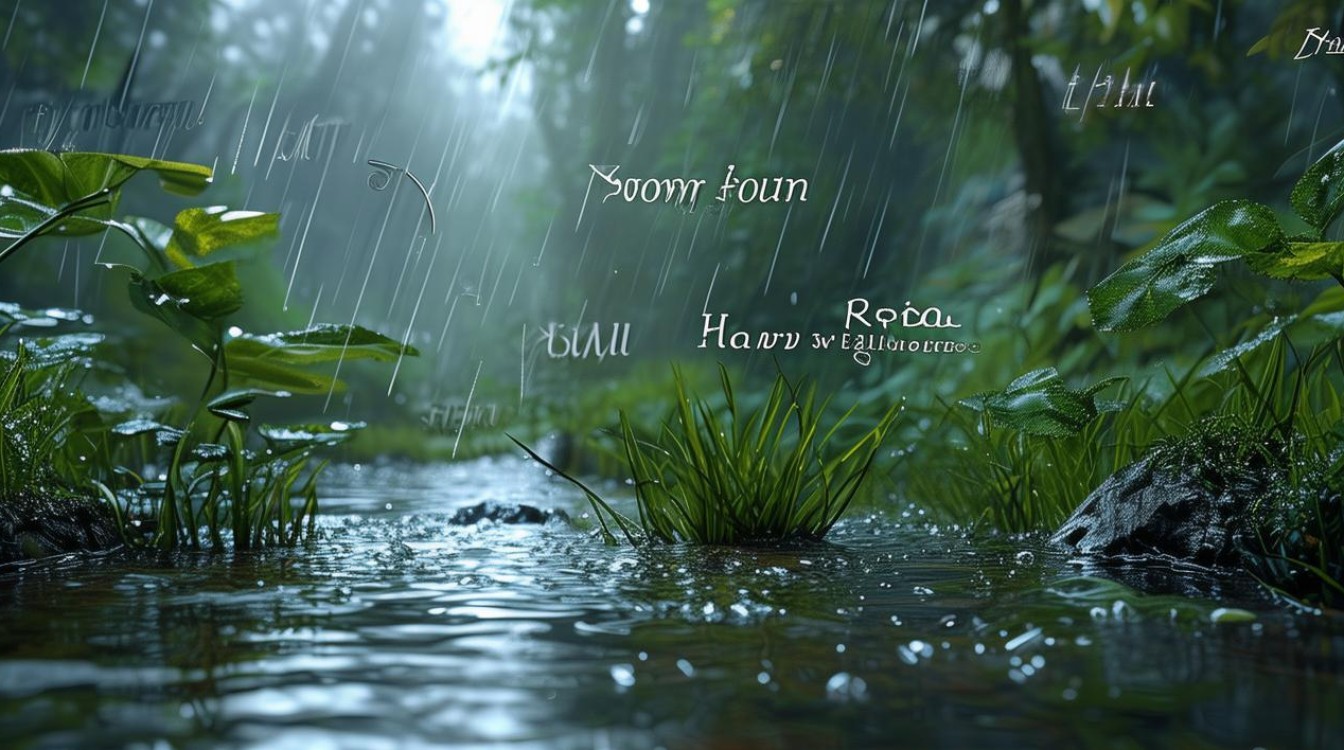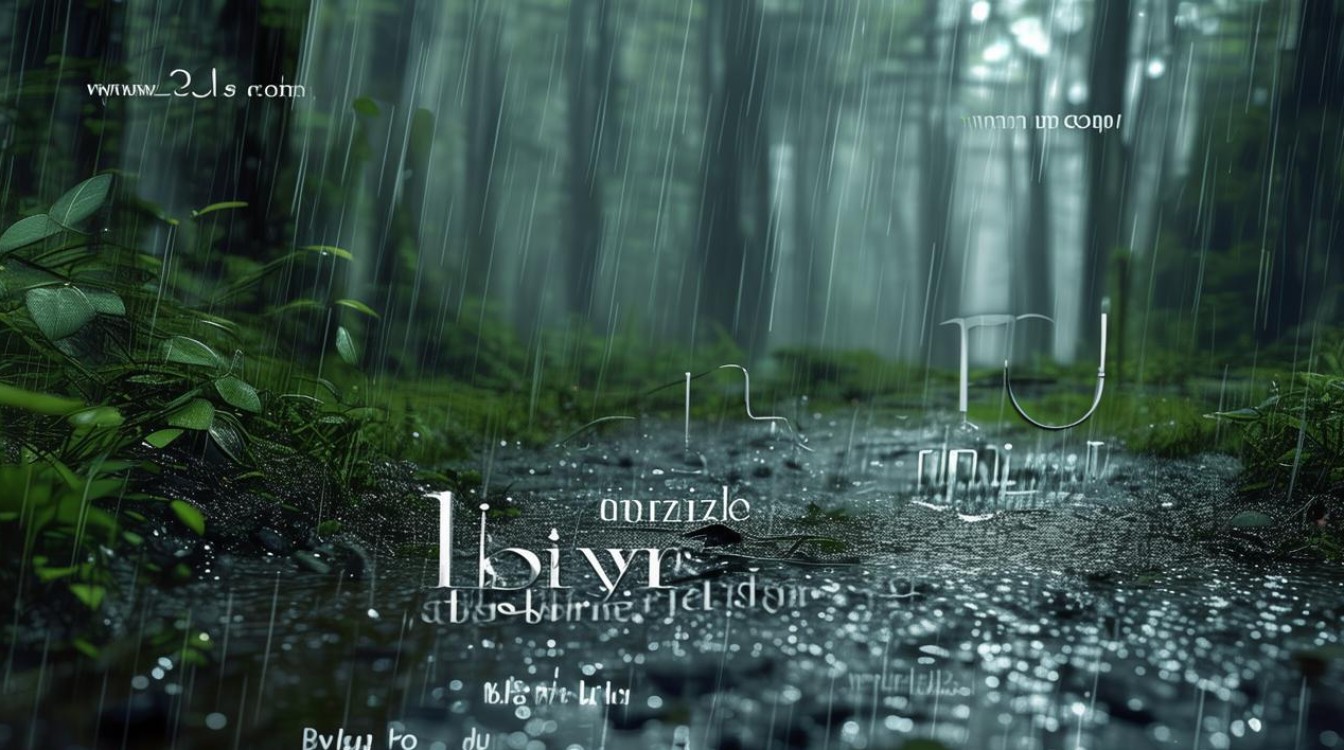Rain has always been more than just weather—it carries emotion, symbolism, and cultural significance. Many English words related to rain hold deeper meanings, reflecting human experiences, moods, and even life philosophies. Let’s explore some of these words and their rich connotations.

Rain – The Foundation of Life and Renewal
The word rain itself symbolizes growth, cleansing, and renewal. In literature, rain often represents a fresh start or emotional release. A sudden downpour can signify a turning point in a story, washing away the past and allowing new beginnings.
In idioms like "save for a rainy day," rain stands for hardship, reminding us to prepare for challenges. This duality—both nourishing and disruptive—makes rain a powerful metaphor.
Drizzle – Patience and Subtlety
Unlike heavy rain, drizzle is light and persistent. It suggests something gradual—perhaps slow progress, quiet persistence, or gentle influence.
A drizzling conversation might mean a soft exchange of thoughts without intensity. In poetry, drizzle can evoke melancholy or a subdued mood, contrasting with the drama of storms.
Downpour – Overwhelming Emotion
A downpour is sudden and intense, often mirroring overwhelming feelings—joy, grief, or anger. When someone says, "It hit me like a downpour," they describe an emotion crashing in without warning.
This word also implies abundance. A downpour of opportunities suggests a flood of chances, almost too many to handle at once.
Deluge – Destruction and Excess
Originating from the Latin diluvium (flood), deluge carries biblical weight—think of Noah’s Ark. It represents not just heavy rain but an unstoppable force, often with negative connotations.
A deluge of emails or work implies being swamped beyond control. Unlike a nourishing rain, a deluge overwhelms, leaving little room for recovery.

Mist – Mystery and Uncertainty
Mist obscures, creating an aura of secrecy. Unlike clear rain, mist blurs boundaries, making it a metaphor for confusion or the unknown.
Phrases like "lost in the mist" suggest uncertainty, while "seeing through the mist" implies gaining clarity. It’s a word of transition—neither fully clear nor completely hidden.
Shower – Blessings and Brief Moments
A shower is short and refreshing, often tied to positivity. "April showers bring May flowers" highlights how brief struggles lead to growth.
In modern slang, showering someone with love means giving abundant affection. Unlike a downpour, a shower feels manageable, even pleasant.
Storm – Chaos and Power
A storm is rain with fury—wind, thunder, and lightning included. It symbolizes turmoil, conflict, or passion. "Weathering the storm" means enduring hardship.
Yet storms also cleanse. After a storm, the air feels fresher, suggesting that even chaos can bring renewal.
Petrichor – The Scent of Nostalgia
This lesser-known word describes the earthy smell after rain. Coined in 1964, petrichor comes from Greek petra (stone) and ichor (the fluid of gods).
The scent triggers memory—childhood summers, fresh soil, or quiet moments. It’s a word that connects rain to deep, almost primal, human experiences.

Raincheck – Postponement Without Regret
Originating from baseball (where tickets could be reused if rain canceled a game), raincheck now means politely deferring plans. Unlike rejection, it implies intent to revisit, keeping connections alive.
Rainbow – Hope After Struggle
No list would be complete without rainbow—the ultimate symbol of beauty after hardship. Scientifically, rainbows need both rain and sunlight, reinforcing the idea that joy follows pain.
Culturally, rainbows promise better days, making them universal symbols of optimism.
Drought – Absence and Longing
The opposite of rain, drought signifies lack—not just of water, but of ideas, love, or opportunities. A creative drought or emotional drought describes barren periods where nourishment is desperately needed.
Pitter-patter – The Sound of Comfort
The pitter-patter of rain is rhythmic, almost soothing. It’s the sound of home, safety, and quiet reflection. Writers use it to evoke coziness, contrasting with the noise of storms.
Cloudburst – Sudden Intensity
A cloudburst is an abrupt, heavy rainfall, often localized. Metaphorically, it mirrors unexpected outbursts—laughter, anger, or inspiration that comes out of nowhere.
Sleet – Harsh Realities
Sleet—rain mixed with snow—is unpleasant, symbolizing half-hearted efforts or mixed emotions. Unlike pure snow’s beauty or rain’s nourishment, sleet is compromise in its rawest form.
Monsoon – Seasonal Transformation
In many cultures, monsoon means life. Crops depend on it, yet floods can destroy. This duality mirrors cycles—destruction and rebirth, year after year.

Dew – Gentle Beginnings
Dew forms overnight, a soft condensation rather than falling rain. It’s linked to dawn, freshness, and delicate beauty. "Dew-kissed grass" suggests untouched purity.
Thunderstorm – Drama and Clarity
Unlike regular storms, thunderstorms add sound and light—crashing drama that demands attention. They symbolize moments of revelation, where truth becomes undeniable.
Flood – Overflow and Consequences
A flood is rain’s aftermath gone wrong. It represents excess—too much emotion, too much information, or too much change at once. Yet floods also reshape landscapes, forcing adaptation.
Damp – Lingering Effects
Damp isn’t outright wetness but lingering moisture. Emotionally, it’s a residue—sadness that lingers, or a hesitation that won’t fade.
Sunshower – Beautiful Contradictions
A sunshower—rain while the sun shines—defies logic. In folklore, it’s magical (foxes marrying, witches dancing). It reminds us that opposites can coexist, creating unexpected beauty.
Rain-related words do more than describe weather—they mirror human experiences. From gentle drizzle to violent storms, each term holds layers of meaning, shaping how we express emotions, challenges, and triumphs. Next time it rains, listen. The language of the sky has much to say.

